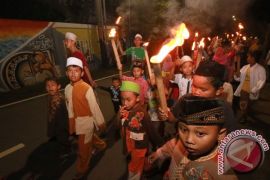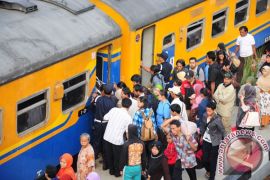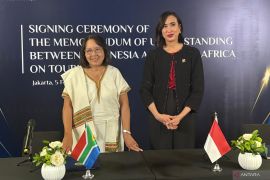On Monday and Tuesday, a multitude of Muslims across the country took the opportunity of the blessed Idul Fitri or Lebaran festivity to visit the graves of dead relatives to offer prayers.
After performing Idul Fitri prayers on Tuesday and holding a family gathering to share a meal and ask for each other`s forgiveness, they make their way to the graves of loved ones.
Bringing flowers, people pack the cemeteries to offer prayers for their dead relatives after the month-long ban on visiting graves during the holy month of Ramadan.
In Denpasar, the provincial capital of predominantly Hindu resort island of Bali, Muslims packed a number of public cemeteries, including Wanasari, on Tuesday.
"We predict that many more Muslims will make devotional visits to the graves of their loved ones this afternoon," Saharudin, a staffer at the office of the Wanasari public cemetery for Muslims said on Tuesday.
He said many other Muslims also visited the graves of their dead relatives on Monday.
"Based on our experience of previous years, the number of people making devotional visits to cemeteries will reach the highest point after Idul Fitri prayers on Wednesday," Saharudin said.
According to him, thousands of pilgrims, not only from Denpasar but also from other districts such as Badung and Gianyar would pack the public cemeteries on Wednesday.
Meanwhile, hundreds of Mt Merapi eruption victims on Tuesday in Sleman district, Yogyakarta, also made devotional visits to the graves of dead family members or relatives.
They came there with flowers to lay at the graves of their loved ones and then say some prayers for them.
Pilgrimages to sacred places or graves of relatives are a traditional activity during the Idul Fitri festivity in Indonesia.
"Although the graves are buried under volcanic materials from Mt Merapi eruptions in 2010, we can still find and identify them," Kepuharjo village head Heri Suprapto said.
He said that besides praying for their dead relatives, the devotional visits to the graves was also an expression of their gratitude to God for His protection.
The visits to sacred places or graves of relatives are usually made on the first day of Idul Fitri after people have held so-called "Halal Bihalal" gatherings with family, relatives, neighbors, and friends to share a meal and ask for each other`s forgiveness.
However, Muslims in Papua`s provincial capital of Jayapura made the devotional visits to the cemeteries of loved ones on Monday, a day ahead of the Lebaran festivity.
The Abepantai and Waena Batas Kota public cemeteries in Abepura and Heram were on Monday seen packed with a multitude of visitors to offer prayers for their dead relatives.
"My family and I bring some flowers to our grandmother`s grave at Abepantai public cemetery to over prayers for her," Rohamad, an Abepura resident, said on Monday.
Rohamad related that last year, when they visited their grandma`s grave in the afternoon, they got trapped in the crowd, so this year they made the devotional visit to the cemetery earlier.
Meanwhile, La Ida of Entrop district said at Waena Batas Kota public cemetery that with his family they made a devotional visit on Monday to clean up their grandfather`s grave and to offer some prayers.
"We visited the cemetery in the run up to Ramadan fasting month, and today we come here again to offer some prayers for our beloved grandpa," La Ida said in the company of his family and relatives.
It is common for Muslims to visit graveyards and pray for the salvation of departed family members after Idul Fitri or Lebaran prayers, but La Ida said they did so in advance in order not to be trapped in the crowds.
During the visit, they clean the graves, recite Ya-Seen, a chapter from the Koran, and then ask God to forgive both the dead and the living for their sins.
On Monday, Muslims in Lombok Timur district, West Nusa Tenggara, also did the same thing.
They made the devotional visits not only to the graves of their loved ones but also to those of prominent scholars who once played a prominent role the struggle for Islam in Lombok Barat district.
Indonesian Muslims usually make the pilgrimage to the graves of loved ones after Idul Fitri or Lebaran prayers but Muslims in the district had been doing it since Monday.
Selong, Kelayu, Kedondong, Sakra, and Gunung Rajak public cemeteries at the NW Pancor Islamic boarding school complex were the most visited after people had performed their Idul Fitri prayers.
A multitude of them also made devotional visits to the graves of Seleparang in Pringgebaya sub-district, of TGH.Ali Batu Bangka in Sakra sub-district, and of TGH.Mutawalli in Jerowaru sub-district.
Lombok Timur Culture and Tourism Office spokesman H.Gufranuddin said almost all Muslims in the district made the devotional visits to the cemeteries as a tradition from generation to generation.
"In reality, the tradition of pilgrimage to the cemeteries here will continue to be maintained because Lombok Timur district at present is promoting religious tourism," Gufranuddin said.
For Muslims, offering prayers for their dead relatives is a must because those who have already died have nothing more to hope for, except for the living to say some prayers for them.
And that, the people can visit the graves of their dead relatives anytime, but it is more special and the right moment for them to bring some flowers with other family members during Idul Fitri holiday. (*)
Reporter: Otniel Tami
Editor: Aditia Maruli Radja
Copyright © ANTARA 2011





